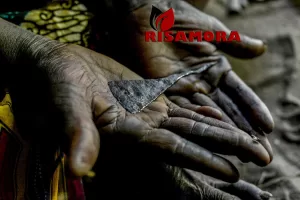
Arnold Ageta
Mutembur village in West Pokot County is about 45 kilometres from Kapenguria town, the headquarters. It is here that I meet Selah (not her real name) who underwent Female Genital Mutilation (FGM) commonly known as mutata tipin, at the age of 10. She had not known the value of education or effects of FGM then.
Selah says she went through FGM and dropped out of school while her friends continued with their studies. She could not continue with her studies because
‘‘At one time, I fainted because of loss of blood due to excessive bleeding. I was unconscious from morning to noon,’’ she recalls.
She adds that she regained her consciousness and found her family feeding her with milk.
Things took a different course when her health deteriorated. Some said that she should be taken to hospital. Others, fearing arrest, proposed that they buy medicine and inject her at home.
After three days, the traditional circumciser who did the ‘cut’ came to visit her. When she inspected her, she discovered that part of her clitoris was remaining. She cut it too.
This worsened her health, making her unable to answer to her short and long calls.
‘‘Nilifimba, ikawa ni ngumu kuenda choo. Nilikuwa nalala na kuinua miguu juu kuenda haja ndogo na kubwa,’’ Selah narrated her ordeal.
(My private parts were swollen and I could not answer to the calls of nature normally. I could answer my calls of nature by lifting my legs up).
At the a tender age of 15, Selah has given birth to two daughters who she says will not undergo the cruel ‘cut’ that almost cost her life.
‘‘My two daughters will not be subjected to the pain and torture I went through,’’ she says amid sobs.
When she was giving birth to her first born, she had complications. She was referred to Kapenguria General Hospital, but they begged the nurse at the local health centre to help her give birth because they feared they will be arrested because of the ‘cut.’
FGM is a violation of human rights of girls and women because it leads to various lifetime complications. Lillian (not her real name) who was cut at the age of 10 recalls one of her friend’s incident.
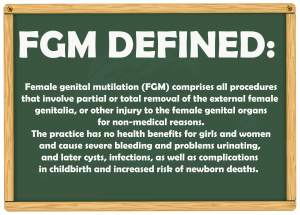
She says: ‘‘My friend bled profusely and I was so scared. If I knew I was going to undergo such pain, I could have ran away.’’
‘‘I witnessed my friends die because of this cut. They bled, fainted and got very ill till their death,’’ she remembers.
Lack of awareness and parents’ pressure for wealth has led to many girls undergoing such a cruel tradition.
‘‘We went for the cut due to peer pressure and pressure from parents who needed wealth. They wanted us to get married so that they get paid bride price,’’ she said.
Many parents in this community look at girls as a source of income. According to the Pokot culture, once the girls are cut, they are ready for marriage.
Like Selah, Lilian swears that she will not let her girls go through this tradition that inflicted her great pain at her tender age.
In another incident, Hellen (not her real name), a mother of four, narrates what she went through.
‘‘I bled for eight hours until I fainted and was unable to see. Instead of taking me to the hospital, they took me to the bush. They then went to get a medical practitioner to come and examine me in the bush because of fear,’’ she remembers the painful incident.
After the treatment, she was taken back to the traditional circumciser who finished the cut.
‘‘It was like being crucified for the second time. It was very painful and I could not take it any more…,’’ she recalled with tears flowing freely from her eyes.
When asked whether she will let her girls undergo the tradition, she strongly disagreed saying she will not torture them in the name of preserving the tradition.
Susan Krop, the chair of Komesi Women Network has been in the frontline in educating the community on the negative effects of FGM.
She says the tradition has led to even more pain in early days of marriages. After the cut, the girls are stitched making their vaginal openings narrow.
‘‘When the lady has been married, the man is unable to gain entry during sex. This therefore, calls for a midwife to use a cattle horn to widen the opening or use a knife to cut open the place. This pain is unbearable for women,’’ says Susan.
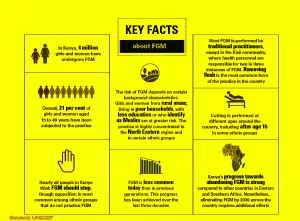
Alternative rites of passage have been said to be the only solution to this torturous tradition.
Ms. Teresa Cheptoo, World Vision’s Child Protection Officer, says they have different programmes that offer alternative rites of passage.
‘‘We have a one week programme where girls are being educated on the effects of FGM before they graduate as adults. The only element we have removed out of this alternative rite of passage is FGM,’’ she said.
According to her, more than 600 girls in West Pokot will benefit from these alternative rites of passage programmes.
Ms. Esther Chepution, a nominated Member of County Assembly (MCA) who is also the chair of Maendeleo ya Wanawake in West Pokot, claims that the government has been lenient on traditional circumcisers.
‘‘They should be punished to set an example on others who do the cutting to the girls clandestinely. They should be arrested and imprisoned to discourage this tradition,’’ she advises.
Men have also joined the fight against FGM in the community. I found them at the World Vision anti-FGM sensitisation meeting held in the community.
Mr. Chesra Yaralima, one of the elders, said that they will not bail out any member of the community who violates the rights of girls through this tradition.
‘‘If one is a criminal, let her be punished. We cannot defend them. FGM has lost meaning in our society,’’ one of the elders emphasized.
Mr. Yaralima, who hails from Siyoi Ward, says t they are planning for a big curse ceremony for anyone who participates in the circumcision of girls in the community.
‘‘In all areas where we cursed, the cut has not been conducted there. The incidents have reduced,’’ he said.
He adds that if all elders join hands with the area chiefs and assistant chiefs in this fight, they will eliminate the tradition in no time.
Many circumcisers have left the cut and embraced new sources of income. One of them is Mama Rhoda who is 70 years old. She is now one of the champions of the anti-FGM crusade in the community.
In her narration on how she used to carry out circumcision, Mama Rhoda says that she could do a second cut if she did not do a proper one at the first instance.
‘‘After three days of cutting, I had to go back to check if I did a proper cut. If it was not proper, I would do another one,’’ she says oblivious of the pain she was causing to the girls to.
‘‘Even if it was painful, I would seek assistance of other women to hold her legs apart until I was done,’’ she explained.
She only minded about getting money, I did not mind about the effects of FGM.
‘‘Even if she fainted, I could carry out my business and go. It was my only source of income,’’ she said.
After witnessing many girls dying under her knife, she stopped the cut and went to church.
‘‘I stopped this practice completely. I now do small businesses to earn a living. My other sources of income include helping women to give birth and sensitizing people on the side effects of FGM through some NGOs operating in the area,’’ she proudly says.
Philip Lomong’in, a legal expert, says Anti-FGM Act, 2011 states that a person who is found guilty of FGM risks a jail term of three years or a fine of Kshs. 200,000.
‘‘If her victim bleeds to death, she will be charged with murder which is punishable with life imprisonment,’’ he warns.
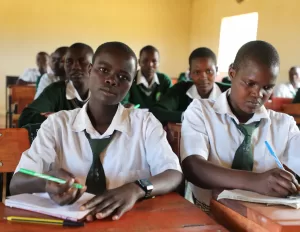
On the other hand, the government has a big role to play in the elimination of this cruel tradition.
The West Pokot County Commissioner, Apollo Okello, says that North Pokot is the area with many reported cases of FGM and early marriages.
‘‘I have ordered my area chiefs, assistant chiefs and deputy county commissioners to put in place measures to curb the tradition.
The famous Kwara Kwara event has been named as one of the leading contributors of FGM in the area.
Esther Cheptuoni, a nominated MCA from Mnagei Ward, West Pokot, says there is a Bill that is being enacted in the County Assembly to illegalize kwara kwara dance festival.
‘‘We have introduced a Bill in the Assembly that seeks to illegalize kwara kwara discos that have led to the increase in FGM cases,’’ she confirmed.
On the same note, the County Commissioner, Mr. Okello says poor infrastructure has made it impossible to eliminate fully the FGM cases in the county.
‘‘This area has largely poor road network. There are many activities that take place during the school holidays including the kwara kwara discos that are conducted at night. These in many occasions, have contributed to many cases of FGM. I have already banned these discos in the county,’’ he warned.
Mr. Okello further warned parents to take care of their children lest they find themselves in the wrong side of the law.
‘‘Some parents cross the border to Uganda to circumcise their girls. I have ordered my security officers at the border to monitor such cases and arrest the culprits,’’ he affirmed.
The County Commissioner said they have established good relations with their Ugandan counterparts to arrest those found committing the act.
A study conducted by the Ministry of Health in 2014 indicates that FGM cases are at 21 percent where the Somali community leads with 91 percent followed closely by Samburu which recorded 86 percent while Kisii and Maasai recorded 86 and 78 percent respectively.
The study further indicates that 21 percent of women between the ages of 15 and 49 underwent FGM.
Ms. Cheptoo adds that World Vision is working with other NGOs and the government to stop FGM in the country.
President William Ruto has confirmed that his government is committed to putting this harsh tradition to an end in the country. He said this during one of the Commission on Justice and Cohesion’s meetings in Nairobi.
‘‘I want to assure you of my administration’s support in ensuring that we eliminate FGM in our country. It is not only retrogressive, but it is a danger to the health of our girls,’’ he said.
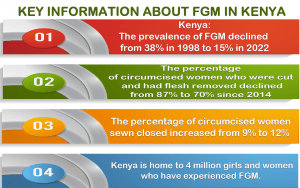
According to a joint study conducted in 2017 by World Vision, UNFPA and UNICEF, West Pokot County recorded 74 percent FGM cases, Central Kajiado had 51 percent, Samburu 71 percent and Marsabit had 78 percent.
The 2010 Constitution of Kenya protects children and women from abuse, harmful cultural practices, and all forms of violence.
The Government of Kenya has enacted legislation prohibiting FGM, including the Prohibition of Female Genital Mutilation Act, 2011 and the Children’s Act, 2022.
Furthermore, Sessional Paper No. 3 of 2019 on the National Policy for the Eradication of Female Genital Mutilation and the National Policy on Gender Based Violence 2019 guide the regulation of FGM in Kenya.
FGM practice, therefore, violates this right of the girl child and should be invoked to the perpetrators.

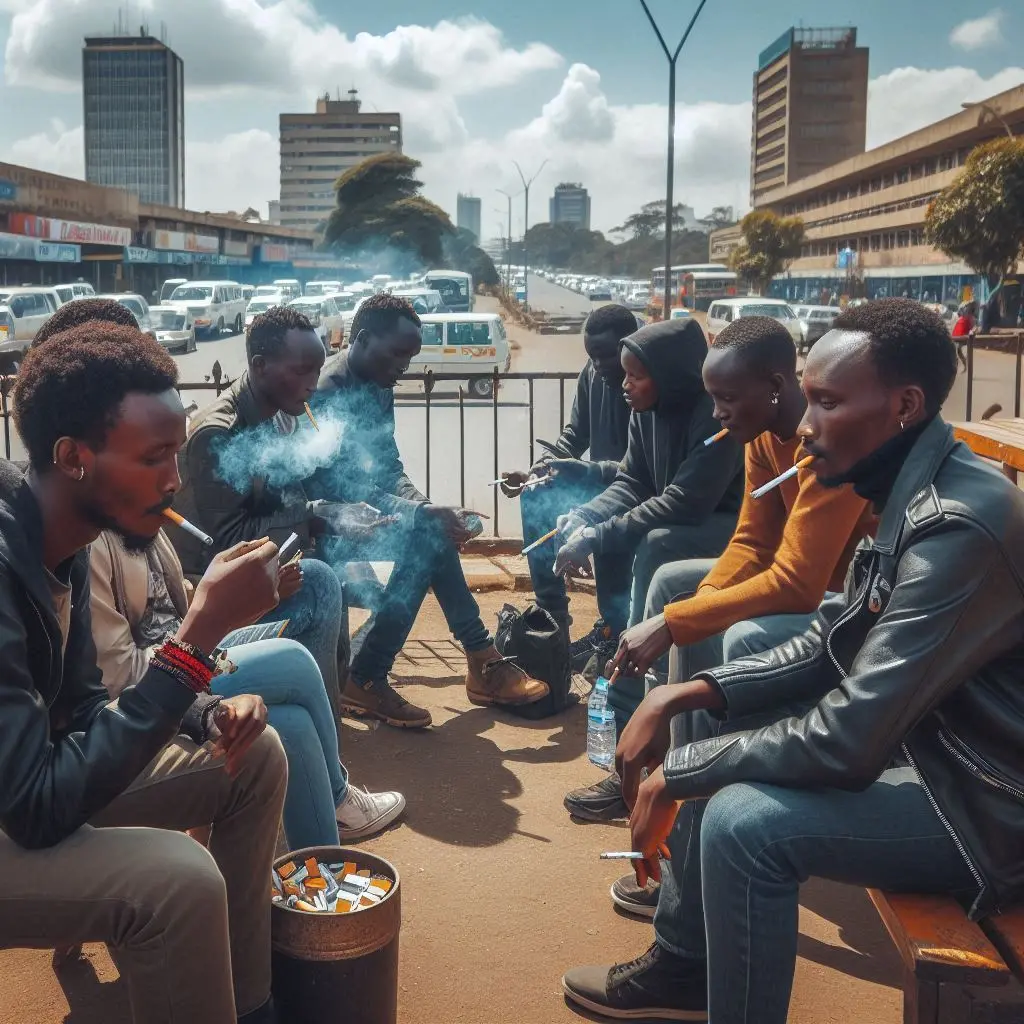
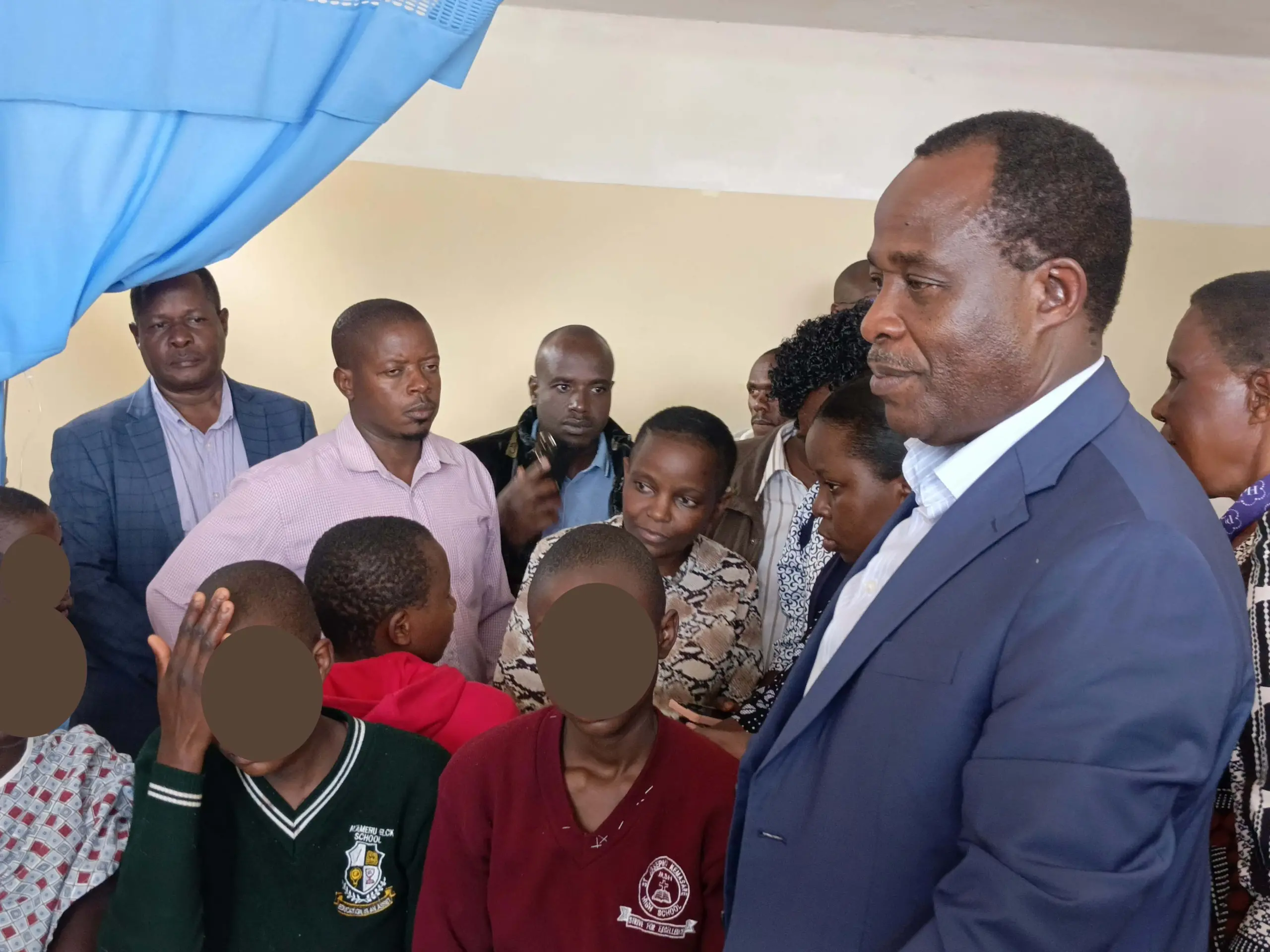
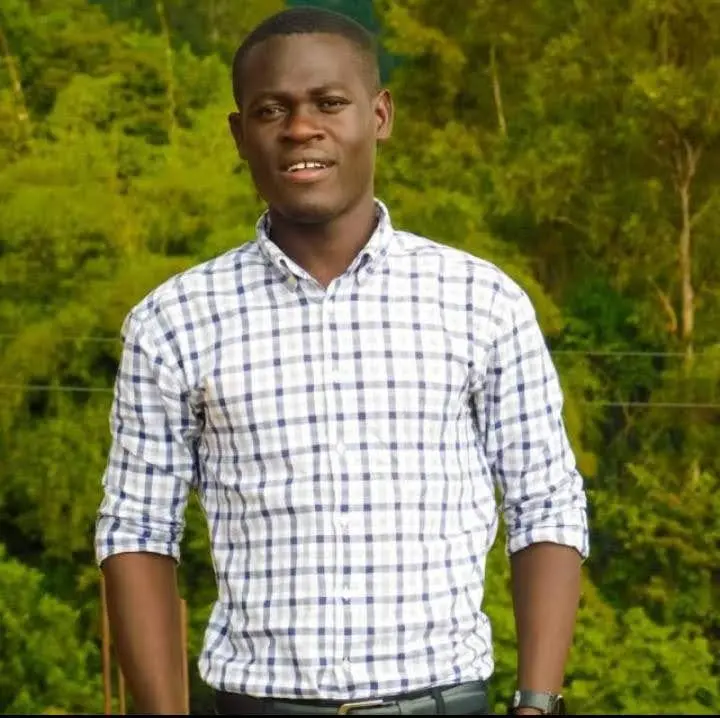
One thought on “Mutata Tipin: Pulling through horrific trauma of FGM in West Pokot”